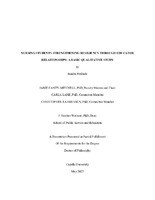Nursing students strengthening resiliency through educator relationships: A basic qualitative study
View File(s)
Visitor Statistics
Visits vs Downloads
Visitors - World Map
Top Visiting Countries
| Country | Visits |
|---|
Top Visiting Cities
| City | Visits |
|---|
Visits (last 6 months)
Downloads (last 6 months)
Popular Works for McDade, Sandra by View
| Title | Page Views |
|---|
Popular Works for McDade, Sandra by Download
| Title | Downloads |
|---|
View Citations
Citations
Nursing school attrition rates are steadily on the rise. Attrition rates are related to high course failure, program drop-out, and burnout. Resiliency is a critical quality that baccalaureate nursing students must attain to cope with nursing school stressors successfully. Nursing student resiliency is in the infancy stage of research investigation; however, literature shows the nurse educator-nursing student's influence on student resiliency; how do senior-level baccalaureate nursing students strengthen resiliency through the nurse educator-nursing student (NE-NS) relationship? The nursing student perspective is often overlooked; therefore, this dissertation focused on bringing forth the perspective of nursing students. Senior-level nursing students have 2 to 3 years to cope with the stressors of nursing school; therefore, they offer invaluable insight. The sample was seven senior-level baccalaureate nursing students who currently had a part-time or full-time enrollment status, fluent in the English language, were 18 years of or older, had positive and negative interactions with nurse educators, and had experience coping with the stressors of nursing school. All seven semi-structured interviews were uploaded into the software MAXQDA 2020 for data analysis. Thematic coding was applied, which yielded four themes and five subthemes. The themes emerged were resiliency, NE-NS relationship, NE attitude, and classroom coping activities. The subthemes were personal motivation, resiliency skillset, ideal NE-NS relationship, role modeling qualities to mimic, NE verbal persuasion, and NE pearls of wisdom. The participants discussed how each theme and subtheme was central to strengthening resiliency. While verbal persuasion and NE pearls of wisdom were the most desired method for strengthening resiliency, it was noted that the NE-NS relationship must be established as positive first.
This dissertation has also been disseminated through the ProQuest Dissertations and Theses database. Dissertation/thesis number: 29214396; ProQuest document ID: 2681522197. The author still retains copyright.
This item has not gone through this repository's peer-review process, but has been accepted by the indicated university or college in partial fulfillment of the requirements for the specified degree.
| Type | Dissertation |
| Acquisition | Proxy-submission |
| Review Type | None: Degree-based Submission |
| Format | Text-based Document |
| Evidence Level | N/A |
| Research Approach | Qualitative Research |
| Keywords | Nursing Education; Student Perspective; Student-Educator Relationship |
| Grantor | Capella University |
| Advisor | Canty-Mitchell, Janie; Rasmussen, Christopher; Lane, Carla |
| Level | PhD |
| Year | 2022 |
All rights reserved by the author(s) and/or publisher(s) listed in this item record unless relinquished in whole or part by a rights notation or a Creative Commons License present in this item record.
All permission requests should be directed accordingly and not to the Sigma Repository.
All submitting authors or publishers have affirmed that when using material in their work where they do not own copyright, they have obtained permission of the copyright holder prior to submission and the rights holder has been acknowledged as necessary.
Related items
Showing items related by title, author, creator and subjects.
-
Health literacy preparation of BSN students: A basic qualitative study
Squellati, Robin E.Understanding the complexity of multiple health conditions, treatment options, and medications requires a high level of health literacy. Yet, 88% of Americans have some deficiency in health literacy. The nursing literature ... -
Incorporating virtual reality in nurse education: A qualitative study of nursing students' perspectives
Saab, Mohamad M.; Hegarty, Josephine; Murphy, David; Landers, Margaret (Elsevier, Ltd., 2021-10)Background: Recent challenges to nurse education have resulted in an increased use of virtual reality which serves as an immersive and effective medium for skill and knowledge acquisition. Virtual reality technology is ... -
Learning to educate: A basic qualitative study of the experiences of training from professional nurses
Clark, Shanda J.The basic qualitative research design allowed for the discovery of how professional nurse participants interpret their experiences about learning how to educate students in the clinical setting. The population studied were ... -
Minority nursing students' perceptions about help-seeking when under stress: A basic qualitative study
Attis-Josias, MarjorieNursing students experience many situations that lead to stress. Stress can have many adverse effects on students, including attrition, and minority nursing students often grapple with a unique set of stressors related to ... -
Emotional intelligence education and civility in nursing education: A basic qualitative study
Ireland, Vicki A.Incivility in nursing is a multidimensional problem that requires a new, innovative approach to managing complicated interpersonal behaviors. Emotional intelligence has emerged as an essential skill for the nursing profession, ...





